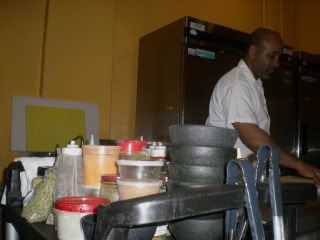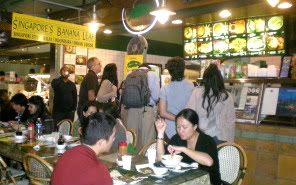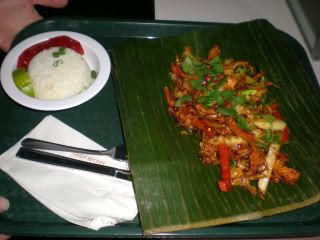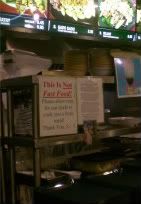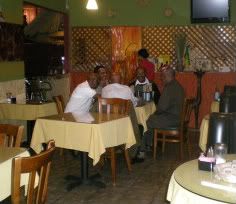 |
| Little Ethiopia Restaurant |
Owning a restaurant is hard work. But Tensay Assress has double the work on his plate. He is the head chef and owner of Little Ethiopia Restaurant. His restaurant isn't just a business but a way for him to share his culture with Americans.
"Most of them, this is their first time doing this," Assress said. "Also this is the first time people are eating with their fingers. So all of the different experiences. You see people enjoying it, you see people trying to share a different culture. That's what actually helps you keep going in this business."
Ethiopian food focuses on enhancing the spices and bringing out their flavors. Assress relates it to Indian and Mexican food since they use many kinds of curry and focus on sauces.
"For some Americans, it might be considered a little spicy," Assress warned. "It's probably one of the most expensive foods to prepare compared to Italian food and all other food because so many spices goes into it."
But there is another detail that separates Ethiopian food from Indian and Mexican cuisine - injera, a spongy type of bread that looks like a crepe or tortilla, is used in place of the usual fork and knife. In all Ethiopian dishes, pork won't be found but rather lamb, beef or chicken. However, many customers find the numerous vegetarian options helpful.
His dishes are as authentic as the food his grandparents and parents grew up eating. Assress was born and raised in the capital, Abbis Ababa. He moved to the United States for high school and college. Although his family hired servants to do the cooking, his mother and grandmother taught him and his four sisters how to cook. Ever since, cooking has been one of his favorite past times and when a family friend asked him to take over the business, he couldn't refuse.
View Little Ethiopia Restaurant in a larger map
Since he took over the restaurant, it has become a gathering place for his family events, where they cook Doro Wot, two chicken legs and a hard boiled egg stewed in a red marinated pepper sauce. Doro Wot is traditionally made for special guests, which makes it an important tradition for his family to continue.
"This is a place where everybody comes to meet, especially on a Sunday maybe after church and stuff," Assress said.
The Assress family isn't the only ones who come to the restaurant frequently. Friends Charlotte Shmazonian and Damali Brown have made it their weekly tradition to have lunch every Sunday.
"I feel like when you go to a small family restaurant its like them," Shmazonian said. "They're cooking the food the way that they learned how to cook it. It's authentic. It's not a commercialized thing. It's not put on. It is what it is."
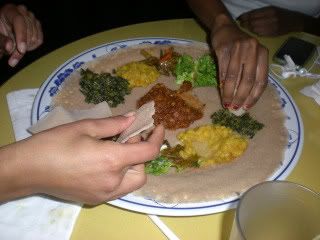 |
| Customers enjoying the vegetarian appetizer. |
Another customer, Schantelle Cason, also enjoys the environment of the restaurant so much that she comes at least once a month. Cason used to work for an Ethiopian restaurant in New Jersey during her grad school years and eating Ethiopian food makes her reminiscent of her past. Her personal favorites are the vegetarian platters.
"It's like eating Southern food, you know. Or anyone else's home cooking, you know," Cason said. "Like it varies from mother to mother but it's all the same."
Apart from the traditional food, customers will be emerged in traditional Ethiopian music and pictures of Ethiopia decorating the walls. While exposing Americans to Ethiopian culture, Assress tries to make a difference back at his home in Ethiopia through fundraising for building schools, creating water wells and planting trees. He even helps the United States by fundraising for cancer and AIDS patients.
"We're out here to better ourselves and to hopefully do something good for this country or the country back home," Assress said. "So any kind of studies that help benefit the whole world, I want to be a part of. So that's just a way of giving back."
